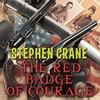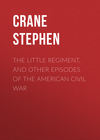Kitabı oku: «Men, Women, and Boats», sayfa 5
CHAPTER V
Directly the tall man went and lay down and began to groan.
The freckled man felt the miseries of the world upon him. He grew angry at the tall man awakening him. They quarrelled.
"Well," said the tall man, finally, "we're in a fix."
"I know that," said the other, sharply.
They regarded the ceiling in silence.
"What in the thunder are we going to do?" demanded the tall man, after a time. His companion was still silent. "Say," repeated he, angrily, "what in the thunder are we going to do?"
"I'm sure I don't know," said the freckled man in a dismal voice.
"Well, think of something," roared the other. "Think of something, you old fool. You don't want to make any more idiots of yourself, do you?"
"I ain't made an idiot of myself."
"Well, think. Know anybody in the city?"
"I know a fellow up in Harlem," said the freckled man.
"You know a fellow up in Harlem," howled the tall man. "Up in Harlem!
How the dickens are we to—say, you're crazy!"
"We can take a cab," cried the other, waxing indignant.
The tall man grew suddenly calm. "Do you know any one else?" he asked, measuredly.
"I know another fellow somewhere on Park Place."
"Somewhere on Park Place," repeated the tall man in an unnatural manner. "Somewhere on Park Place." With an air of sublime resignation he turned his face to the wall.
The freckled man sat erect and frowned in the direction of his companion. "Well, now, I suppose you are going to sulk. You make me ill! It's the best we can do, ain't it? Hire a cab and go look that fellow up on Park—What's that? You can't afford it? What nonsense! You are getting—Oh! Well, maybe we can beg some clothes of the captain. Eh? Did I see 'im? Certainly, I saw 'im. Yes, it is improbable that a man who wears trousers like that can have clothes to lend. No, I won't wear oilskins and a sou'-wester. To Athens? Of course not! I don't know where it is. Do you? I thought not. With all your grumbling about other people, you never know anything important yourself. What? Broadway? I'll be hanged first. We can get off at Harlem, man alive. There are no cabs in Harlem. I don't think we can bribe a sailor to take us ashore and bring a cab to the dock, for the very simple reason that we have nothing to bribe him with. What? No, of course not. See here, Tom Sharp, don't you swear at me like that. I won't have it. What's that? I ain't, either. I ain't. What? I am not. It's no such thing. I ain't. I've got more than you have, anyway. Well, you ain't doing anything so very brilliant yourself—just lying there and cussin'." At length the tall man feigned prodigiously to snore. The freckled man thought with such vigor that he fell asleep.
After a time he dreamed that he was in a forest where bass drums grew on trees. There came a strong wind that banged the fruit about like empty pods. A frightful din was in his ears.
He awoke to find the captain of the schooner standing over him.
"We're at New York now," said the captain, raising his voice above the thumping and banging that was being done on deck, "an' I s'pose you fellers wanta go ashore." He chuckled in an exasperating manner. "Jes' sing out when yeh wanta go," he added, leering at the freckled man.
The tall man awoke, came over and grasped the captain by the throat.
"If you laugh again I'll kill you," he said.
The captain gurgled and waved his legs and arms.
"In the first place," the tall man continued, "you rescued us in a deucedly shabby manner. It makes me ill to think of it. I've a mind to mop you 'round just for that. In the second place, your vessel is bound for Athens, N. Y., and there's no sense in it. Now, will you or will you not turn this ship about and take us back where our clothes are, or to Philadelphia, where we belong?"
He furiously shook the captain. Then he eased his grip and awaited a reply.
"I can't," yelled the captain, "I can't. This vessel don't belong to me. I've got to—"
"Well, then," interrupted the tall man, "can you lend us some clothes?"
"Hain't got none," replied the captain, promptly. His face was red, and his eyes were glaring.
"Well, then," said the tall man, "can you lend us some money?"
"Hain't got none," replied the captain, promptly. Something overcame him and he laughed.
"Thunderation," roared the tall man. He seized the captain, who began to have wriggling contortions. The tall man kneaded him as if he were biscuits. "You infernal scoundrel," he bellowed, "this whole affair is some wretched plot, and you are in it. I am about to kill you."
The solitary whisker of the captain did acrobatic feats like a strange demon upon his chin. His eyes stood perilously from his head. The suspender wheezed and tugged like the tackle of a sail.
Suddenly the tall man released his hold. Great expectancy sat upon his features. "It's going to break!" he cried, rubbing his hands.
But the captain howled and vanished in the sky.
The freckled man then came forward. He appeared filled with sarcasm.
"So!" said he. "So, you've settled the matter. The captain is the only man in the world who can help us, and I daresay he'll do anything he can now."
"That's all right," said the tall man. "If you don't like the way I run things you shouldn't have come on this trip at all."
They had another quarrel.
At the end of it they went on deck. The captain stood at the stern addressing the bow with opprobrious language. When he perceived the voyagers he began to fling his fists about in the air.
"I'm goin' to put yeh off!" he yelled. The wanderers stared at each other.
"Hum," said the tall man.
The freckled man looked at his companion. "He's going to put us off, you see," he said, complacently.
The tall man began to walk about and move his shoulders. "I'd like to see you do it," he said, defiantly.
The captain tugged at a rope. A boat came at his bidding.
"I'd like to see you do it," the tall man repeated, continually. An imperturbable man in rubber boots climbed down in the boat and seized the oars. The captain motioned downward. His whisker had a triumphant appearance.
The two wanderers looked at the boat. "I guess we'll have to get in," murmured the freckled man.
The tall man was standing like a granite column. "I won't," said he. "I won't! I don't care what you do, but I won't!"
"Well, but—" expostulated the other. They held a furious debate.
In the meantime the captain was darting about making sinister gestures, but the back of the tall man held him at bay. The crew, much depleted by the departure of the imperturbable man into the boat, looked on from the bow.
"You're a fool," the freckled man concluded his argument.
"So?" inquired the tall man, highly exasperated.
"So! Well, if you think you're so bright, we'll go in the boat, and then you'll see."
He climbed down into the craft and seated himself in an ominous manner at the stern.
"You'll see," he said to his companion, as the latter floundered heavily down. "You'll see!"
The man in rubber boots calmly rowed the boat toward the shore. As they went, the captain leaned over the railing and laughed. The freckled man was seated very victoriously.
"Well, wasn't this the right thing after all?" he inquired in a pleasant voice. The tall man made no reply.
CHAPTER VI
As they neared the dock something seemed suddenly to occur to the freckled man.
"Great heavens!" he murmured. He stared at the approaching shore.
"My, what a plight, Tommy!" he quavered.
"Do you think so?" spoke up the tall man. "Why, I really thought you liked it." He laughed in a hard voice. "Lord, what a figure you'll cut."
This laugh jarred the freckled man's soul. He became mad.
"Thunderation, turn the boat around!" he roared. "Turn 'er round, quick! Man alive, we can't—turn 'er round, d'ye hear!"
The tall man in the stern gazed at his companion with glowing eyes.
"Certainly not," he said. "We're going on. You insisted Upon it." He began to prod his companion with words.
The freckled man stood up and waved his arms.
"Sit down," said the tall man. "You'll tip the boat over."
The other man began to shout.
"Sit down!" said the tall man again.
Words bubbled from the freckled man's mouth. There was a little torrent of sentences that almost choked him. And he protested passionately with his hands.
But the boat went on to the shadow of the docks. The tall man was intent upon balancing it as it rocked dangerously during his comrade's oration.
"Sit down," he continually repeated.
"I won't," raged the freckled man. "I won't do anything." The boat wobbled with these words.
"Say," he continued, addressing the oarsman, "just turn this boat round, will you? Where in the thunder are you taking us to, anyhow?"
The oarsman looked at the sky and thought. Finally he spoke. "I'm doin' what the cap'n sed."
"Well, what in th' blazes do I care what the cap'n sed?" demanded the freckled man. He took a violent step. "You just turn this round or—"
The small craft reeled. Over one side water came flashing in. The freckled man cried out in fear, and gave a jump to the other side. The tall man roared orders, and the oarsman made efforts. The boat acted for a moment like an animal on a slackened wire. Then it upset.
"Sit down!" said the tall man, in a final roar as he was plunged into the water. The oarsman dropped his oars to grapple with the gunwale. He went down saying unknown words. The freckled man's explanation or apology was strangled by the water.
Two or three tugs let off whistles of astonishment, and continued on their paths. A man dozing on a dock aroused and began to caper.
The passengers on a ferry-boat all ran to the near railing. A miraculous person in a small boat was bobbing on the waves near the piers. He sculled hastily toward the scene. It was a swirl of waters in the midst of which the dark bottom of the boat appeared, whale-like.
Two heads suddenly came up.
"839," said the freckled man, chokingly. "That's it! 839!"
"What is?" said the tall man.
"That's the number of that feller on Park Place. I just remembered."
"You're the bloomingest—" the tall man said.
"It wasn't my fault," interrupted his companion. "If you hadn't—" He tried to gesticulate, but one hand held to the keel of the boat, and the other was supporting the form of the oarsman. The latter had fought a battle with his immense rubber boots and had been conquered.
The rescuer in the other small boat came fiercely. As his craft glided up, he reached out and grasped the tall man by the collar and dragged him into the boat, interrupting what was, under the circumstances, a very brilliant flow of rhetoric directed at the freckled man. The oarsman of the wrecked craft was taken tenderly over the gunwale and laid in the bottom of the boat. Puffing and blowing, the freckled man climbed in.
"You'll upset this one before we can get ashore," the other voyager remarked.
As they turned toward the land they saw that the nearest dock was lined with people. The freckled man gave a little moan.
But the staring eyes of the crowd were fixed on the limp form of the man in rubber boots. A hundred hands reached down to help lift the body up. On the dock some men grabbed it and began to beat it and roll it. A policeman tossed the spectators about. Each individual in the heaving crowd sought to fasten his eyes on the blue-tinted face of the man in the rubber boots. They surged to and fro, while the policeman beat them indiscriminately.
The wanderers came modestly up the dock and gazed shrinkingly at the throng. They stood for a moment, holding their breath to see the first finger of amazement levelled at them.
But the crowd bended and surged in absorbing anxiety to view the man in rubber boots, whose face fascinated them. The sea-wanderers were as though they were not there.
They stood without the jam and whispered hurriedly.
"839," said the freckled man.
"All right," said the tall man.
Under the pommeling hands the oarsman showed signs of life. The voyagers watched him make a protesting kick at the leg of the crowd, the while uttering angry groans.
"He's better," said the tall man, softly; "let's make off."
Together they stole noiselessly up the dock. Directly in front of it they found a row of six cabs.
The drivers on top were filled with a mighty curiosity. They had driven hurriedly from the adjacent ferry-house when they had seen the first running sign of an accident. They were straining on their toes and gazing at the tossing backs of the men in the crowd.
The wanderers made a little detour, and then went rapidly towards a cab. They stopped in front of it and looked up.
"Driver," called the tall man, softly.
The man was intent.
"Driver," breathed the freckled man. They stood for a moment and gazed imploringly.
The cabman suddenly moved his feet. "By Jimmy, I bet he's a gonner," he said, in an ecstacy, and he again relapsed into a statue.
The freckled man groaned and wrung his hands. The tall man climbed into the cab.
"Come in here," he said to his companion. The freckled man climbed in, and the tall man reached over and pulled the door shut. Then he put his head out the window.
"Driver," he roared, sternly, "839 Park Place—and quick."
The driver looked down and met the eye of the tall man. "Eh?—Oh—839?
Park Place? Yessir." He reluctantly gave his horse a clump on the back.
As the conveyance rattled off the wanderers huddled back among the dingy cushions and heaved great breaths of relief.
"Well, it's all over," said the freckled man, finally. "We're about out of it. And quicker than I expected. Much quicker. It looked to me sometimes that we were doomed. I am thankful to find it not so. I am rejoiced. And I hope and trust that you—well, I don't wish to—perhaps it is not the proper time to—that is, I don't wish to intrude a moral at an inopportune moment, but, my dear, dear fellow, I think the time is ripe to point out to you that your obstinacy, your selfishness, your villainous temper, and your various other faults can make it just as unpleasant for your ownself, my dear boy, as they frequently do for other people. You can see what you brought us to, and I most sincerely hope, my dear, dear fellow, that I shall soon see those signs in you which shall lead me to believe that you have become a wiser man."
THE END OF THE BATTLE
A sergeant, a corporal, and fourteen men of the Twelfth Regiment of the Line had been sent out to occupy a house on the main highway. They would be at least a half of a mile in advance of any other picket of their own people. Sergeant Morton was deeply angry at being sent on this duty. He said that he was over-worked. There were at least two sergeants, he claimed furiously, whose turn it should have been to go on this arduous mission. He was treated unfairly; he was abused by his superiors; why did any damned fool ever join the army? As for him he would get out of it as soon as possible; he was sick of it; the life of a dog. All this he said to the corporal, who listened attentively, giving grunts of respectful assent. On the way to this post two privates took occasion to drop to the rear and pilfer in the orchard of a deserted plantation. When the sergeant discovered this absence, he grew black with a rage which was an accumulation of all his irritations. "Run, you!" he howled. "Bring them here! I'll show them—" A private ran swiftly to the rear. The remainder of the squad began to shout nervously at the two delinquents, whose figures they could see in the deep shade of the orchard, hurriedly picking fruit from the ground and cramming it within their shirts, next to their skins. The beseeching cries of their comrades stirred the criminals more than did the barking of the sergeant. They ran to rejoin the squad, while holding their loaded bosoms and with their mouths open with aggrieved explanations.
Jones faced the sergeant with a horrible cancer marked in bumps on his left side. The disease of Patterson showed quite around the front of his waist in many protuberances. "A nice pair!" said the sergeant, with sudden frigidity. "You're the kind of soldiers a man wants to choose for a dangerous outpost duty, ain't you?"
The two privates stood at attention, still looking much aggrieved. "We only—" began Jones huskily.
"Oh, you 'only!'" cried the sergeant. "Yes, you 'only.' I know all about that. But if you think you are going to trifle with me—"
A moment later the squad moved on towards its station. Behind the sergeant's back Jones and Patterson were slyly passing apples and pears to their friends while the sergeant expounded eloquently to the corporal. "You see what kind of men are in the army now. Why, when I joined the regiment it was a very different thing, I can tell you. Then a sergeant had some authority, and if a man disobeyed orders, he had a very small chance of escaping something extremely serious. But now! Good God! If I report these men, the captain will look over a lot of beastly orderly sheets and say—'Haw, eh, well, Sergeant Morton, these men seem to have very good records; very good records, indeed. I can't be too hard on them; no, not too hard.'" Continued the sergeant: "I tell you, Flagler, the army is no place for a decent man."
Flagler, the corporal, answered with a sincerity of appreciation which with him had become a science. "I think you are right, sergeant," he answered.
Behind them the privates mumbled discreetly. "Damn this sergeant of ours. He thinks we are made of wood. I don't see any reason for all this strictness when we are on active service. It isn't like being at home in barracks! There is no great harm in a couple of men dropping out to raid an orchard of the enemy when all the world knows that we haven't had a decent meal in twenty days."
The reddened face of Sergeant Morton suddenly showed to the rear. "A little more marching and less talking," he said.
When he came to the house he had been ordered to occupy the sergeant sniffed with disdain. "These people must have lived like cattle," he said angrily. To be sure, the place was not alluring. The ground floor had been used for the housing of cattle, and it was dark and terrible. A flight of steps led to the lofty first floor, which was denuded but respectable. The sergeant's visage lightened when he saw the strong walls of stone and cement. "Unless they turn guns on us, they will never get us out of here," he said cheerfully to the squad. The men, anxious to keep him in an amiable mood, all hurriedly grinned and seemed very appreciative and pleased. "I'll make this into a fortress," he announced. He sent Jones and Patterson, the two orchard thieves, out on sentry-duty. He worked the others, then, until he could think of no more things to tell them to do. Afterwards he went forth, with a major-general's serious scowl, and examined the ground in front of his position. In returning he came upon a sentry, Jones, munching an apple. He sternly commanded him to throw it away.
The men spread their blankets on the floors of the bare rooms, and putting their packs under their heads and lighting their pipes, they lived an easy peace. Bees hummed in the garden, and a scent of flowers came through the open window. A great fan-shaped bit of sunshine smote the face of one man, and he indolently cursed as he moved his primitive bed to a shadier place.
Another private explained to a comrade: "This is all nonsense anyhow.
No sense in occupying this post. They—"
"But, of course," said the corporal, "when she told me herself that she cared more for me than she did for him, I wasn't going to stand any of his talk—" The corporal's listener was so sleepy that he could only grunt his sympathy.
There was a sudden little spatter of shooting. A cry from Jones rang out. With no intermediate scrambling, the sergeant leaped straight to his feet. "Now," he cried, "let us see what you are made of! If," he added bitterly, "you are made of anything!"
A man yelled: "Good God, can't you see you're all tangled up in my cartridge belt?"
Another man yelled: "Keep off my legs! Can't you walk on the floor?"
To the windows there was a blind rush of slumberous men, who brushed hair from their eyes even as they made ready their rifles. Jones and Patterson came stumbling up the steps, crying dreadful information.
Already the enemy's bullets were spitting and singing over the house.
The sergeant suddenly was stiff and cold with a sense of the importance of the thing. "Wait until you see one," he drawled loudly and calmly, "then shoot."
For some moments the enemy's bullets swung swifter than lightning over the house without anybody being able to discover a target. In this interval a man was shot in the throat. He gurgled, and then lay down on the floor. The blood slowly waved down the brown skin of his neck while he looked meekly at his comrades.
There was a howl. "There they are! There they come!" The rifles crackled. A light smoke drifted idly through the rooms. There was a strong odor as if from burnt paper and the powder of firecrackers. The men were silent. Through the windows and about the house the bullets of an entirely invisible enemy moaned, hummed, spat, burst, and sang.
The men began to curse. "Why can't we see them?" they muttered through their teeth. The sergeant was still frigid. He answered soothingly as if he were directly reprehensible for this behavior of the enemy. "Wait a moment. You will soon be able to see them. There! Give it to them!" A little skirt of black figures had appeared in a field. It was really like shooting at an upright needle from the full length of a ballroom. But the men's spirits improved as soon as the enemy—this mysterious enemy—became a tangible thing, and far off. They had believed the foe to be shooting at them from the adjacent garden.
"Now," said the sergeant ambitiously, "we can beat them off easily if you men are good enough."
A man called out in a tone of quick, great interest. "See that fellow on horseback, Bill? Isn't he on horseback? I thought he was on horseback."
There was a fusilade against another side of the house. The sergeant dashed into the room which commanded the situation. He found a dead soldier on the floor. He rushed out howling: "When was Knowles killed? When was Knowles killed? When was Knowles killed? Damn it, when was Knowles killed?" It was absolutely essential to find out the exact moment this man died. A blackened private turned upon his sergeant and demanded: "How in hell do I know?" Sergeant Morton had a sense of anger so brief that in the next second he cried: "Patterson!" He had even forgotten his vital interest in the time of Knowles' death.
"Yes?" said Patterson, his face set with some deep-rooted quality of determination. Still, he was a mere farm boy.
"Go in to Knowles' window and shoot at those people," said the sergeant hoarsely. Afterwards he coughed. Some of the fumes of the fight had made way to his lungs.
Patterson looked at the door into this other room. He looked at it as if he suspected it was to be his death-chamber. Then he entered and stood across the body of Knowles and fired vigorously into a group of plum trees.
"They can't take this house," declared the sergeant in a contemptuous and argumentative tone. He was apparently replying to somebody. The man who had been shot in the throat looked up at him. Eight men were firing from the windows. The sergeant detected in a corner three wounded men talking together feebly. "Don't you think there is anything to do?" he bawled. "Go and get Knowles' cartridges and give them to somebody who can use them! Take Simpson's too." The man who had been shot in the throat looked at him. Of the three wounded men who had been talking, one said: "My leg is all doubled up under me, sergeant." He spoke apologetically.
Meantime the sergeant was re-loading his rifle. His foot slipped in the blood of the man who had been shot in the throat, and the military boot made a greasy red streak on the floor.
"Why, we can hold this place!" shouted the sergeant jubilantly. "Who says we can't?"
Corporal Flagler suddenly spun away from his window and fell in a heap.
"Sergeant," murmured a man as he dropped to a seat on the floor out of danger, "I can't stand this. I swear I can't. I think we should run away."
Morton, with the kindly eyes of a good shepherd, looked at the man. "You are afraid, Johnston, you are afraid," he said softly. The man struggled to his feet, cast upon the sergeant a gaze full of admiration, reproach, and despair, and returned to his post. A moment later he pitched forward, and thereafter his body hung out of the window, his arms straight and the fists clenched. Incidentally this corpse was pierced afterwards by chance three times by bullets of the enemy.
The sergeant laid his rifle against the stonework of the window-frame and shot with care until his magazine was empty. Behind him a man, simply grazed on the elbow, was wildly sobbing like a girl. "Damn it, shut up!" said Morton, without turning his head. Before him was a vista of a garden, fields, clumps of trees, woods, populated at the time with little fleeting figures.
He grew furious. "Why didn't he send me orders?" he cried aloud. The emphasis on the word "he" was impressive. A mile back on the road a galloper of the Hussars lay dead beside his dead horse.
The man who had been grazed on the elbow still set up his bleat. Morton's fury veered to this soldier. "Can't you shut up? Can't you shut up? Can't you shut up? Fight! That's the thing to do. Fight!"
A bullet struck Morton, and he fell upon the man who had been shot in the throat. There was a sickening moment. Then the sergeant rolled off to a position upon the bloody floor. He turned himself with a last effort until he could look at the wounded who were able to look at him.
"Kim up, the Kickers," he said thickly. His arms weakened and he dropped on his face.
After an interval a young subaltern of the enemy's infantry, followed by his eager men, burst into this reeking interior. But just over the threshold he halted before the scene of blood and death. He turned with a shrug to his sergeant. "God, I should have estimated them at least one hundred strong."








